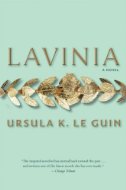 Lavinia by Ursula K.Le Guin
Lavinia by Ursula K.Le Guin
Mariner Books,
Houghton Mifflin Harcourt,
Boston & New York, 2008
Out of myth Ursula K. Le Guin has given voice to a woman who had no voice. Based on the last five books of Virgil’s unfinished epic, The Aeneid, Lavinia is the story of a character barely mentioned in the original poem.
The daughter of the ruler of Laurentum, King Latinus and his queen Amata, Lavinia is raised in an early agricultural society during a time of peace and plenty. She helps with daily rituals and gathers salt for sacrifices. She loves the land.
The king’s house where I live is a square divided in four quarters; the great laurel tree is at the crossing, the center. I go out at first dawn from the house and from the city into the fields east of the city.
The pagus where we pagans live is the pattern of the farmer’s fields, outlined by the paths between the fields. At the crossing, where the four fields meet, is the shrine of the Lares, the spirits of the meeting place. the shrine has four doors and before each door is the altar of the farmer’s field. I stand out on one of the paths between the fields, looking at the sky.
The house of the sky is limitless, but with my mind I give it borders and divide it into four. I stand at the center, the crossing, facing south, facing Ardea. I watch the empty sky into which light flows upward slowly. Crows fly from the left, from the eastern hills, circle above me calling, and return into the sunrise that crowns the hills with fire. It is a good omen but the red sunrise foretells a stormy day. Page 26
One evening her father takes her to a nearby oracle where she meets the wraith of her poet, Virgil, and begins discovering her destiny. She is to marry a foreigner, a wandering Trojan named Aeneas, but her mother wishes her to marry her cousin, Turnus. When Aeneas arrives her world dissolves into war.
It was very beautiful, the bristling glitter of lance heads far off there, moving quickly nearer and nearer. The air was shaken with the thrilling drum of the feet of horses at the gallop. All along the lines of men drawn up in front of the city, spears and lances reared up into the sunlight, and horses began to whinny and shift and fight thr reins. Then the Etruscan horns and trumpets sounded their battle signals, some deep and hoarse, some silvery sweet. The attackers came on; the defenders stood firm; for a moment everything seemed to stop, hold still. With a blare of horns and a great shout of men’s voices, arrows, javelins and lances went up from both sides, a swift darkness passing and crossing in the air between the two armies. Under the iron rain they met face to face, men afoot and horsemen, body to body. Page 154
In Le Guin’s Latinum time flows backwards and forwards and Lavinia’s voice is the path we follow to guide us through. Le Guin writes in clear, crisp prose of bronze age Italy, of the people, the rituals and the culture. She depicts the battles of Virgil’s epic in a way that has us hear the clash of weapons and the battle cries. Parts of this novel are bathed in blood.
A huge amount of research went into this work. Le Guin learned Latin so she could read Virgil’s original verse and she read diverse texts about this little known time in history. I found Le Guin’s story telling devices intriguing and fun. Taking a Roman poet, writing in the first century BCE, having him visit a princess alive 800 years before his birth in a dream, having her be aware of herself as a character in an epic poem and telling the story of a mythic King and many bloody battles so that it all fits together takes tremendous skill. Lavina speaks of her poet, discusses her fate, knows her future and somehow this all works. Le Guin has written fantasy for decades and I honor her abilities. She is a master at myth-making.
As a character, Lavinia came alive for me, I did not find her “self-awareness” disturbing and I loved the ending. I will read this novel over and over and I encourage others to join me.
Here is a link to talk and reading by Ursula K. Le Guin. I would have loved to have been there. In June Lavinia received the 2009 Locus Award for best fantasy novel.
Other reviews:

When I saw your post, I immediately went scurrying for my list, because the name sounded familiar. I just wrote down a book called “The Lathe of Heaven” written by her, which was reviewed by C.B. James. She sounds like an amazing author.
Sandy – Le Guin is one of my heros. “Lathe of Heaven” is sci-fi and a great book. Add “The Wizard of Earthsea” to your list and show it to you kids!
This book came out while I was taking an Images of Roman Women course and I’ve been dying to pick it up ever since. Alas, another book I really ought to get around to reading.
Pingback: Sunday Salon – Favorite Books – Part Two « Page247
Pingback: The Golden Mean by Annabel Lyon « Page247
Pingback: Ursula K. LeGuin – Lavinia « Fyrefly's Book Blog